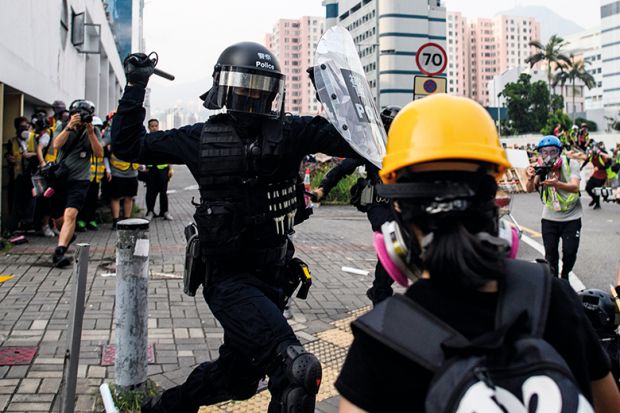A historian’s study of dictators has come worryingly close to home.
Frank Dikötter, professor of humanities at the University of Hong Kong, is best known for his devastating trilogy about life in China under Mao Zedong: the award-winning Mao’s Great Famine (2010), The Tragedy of Liberation (2013) and The Cultural Revolution (2016). Like his other non-academic books, these are banned in China – something he welcomes, since it means he “can go back and work on the archives, because my name has been erased. Some of the archivists know me, but they don’t know what I’m up to or what I’ve published. There is no Google. And my books aren’t available.”
For his latest book, How to Be a Dictator: The Cult of Personality in the Twentieth Century (Bloomsbury), Professor Dikötter has put together sharp portraits of Mussolini, Hitler, Stalin, Mao, Kim Il-sung, Duvalier, Ceauşescu and Mengistu. In each case, he had “relentlessly focussed on power: how dictators acquire it, how they keep it – the cult of personality is a very large part of that”.
The good news is that the great age of dictators is over. Though Professor Dikötter acknowledged that “vigilance is extremely important”, he was impatient with claims that “[Donald] Trump and Boris Johnson are turning into dictators”. “It belittles what happened to literally hundreds of millions of people if you start using those terms,” he said.
Unfortunately, China has bucked the wider positive trend.
Ever since he was a student there in 1985-87 and again in the months leading up to the 1989 massacre in Tiananmen Square, Professor Dikötter has been sceptical of the idea that the People’s Republic is “substantially different from the regime under Mao” or “moving towards greater openness and economic reform”. Xi Jinping is still “head of the one-party state…the iron underpinnings of the party are still there. If I were to join the history department at Shanghai University, there would be a party secretary who decides what I can teach, what I can research and who we can invite to the department, not to mention who gets a promotion.” All China’s leaders “want their writings or musings inscribed into the party charter” and “all demand absolute loyalty. That is the key value for dictators.”
As Chinese plans for the citizens of Hong Kong as well as the mainland have become clearer, Professor Dikötter has witnessed “a real sense of desperation among young people” such as his students, since “everyone is all too well aware of how fragile their basic freedoms are, and how hell-bent the mainland is to crush them. This is a regime that believes you should govern by clubbing people.”
“Until 2014, it all seemed rather far away,” he explained, “as if the mainland was the mainland and Hong Kong would be Hong Kong. In 1997, under the so-called ‘One Country, Two Systems’ agreement, meant to last 50 years, the idea was that the PRC would become like Hong Kong. But that now seems like a very distant dream. It’s clear that Hong Kong is being forced to become like any city on the mainland.”
Though the atmosphere had deteriorated since the Beijing Olympics in 2008, the final straw came in 2014, when it became evident that China was reneging on its 1997 commitment to holding full elections. This had led to “the Umbrella Movement” and Occupy Central with Love and Peace, which Professor Dikötter described as “probably one of the most civil demonstrations on planet Earth, with people cleaning up behind them and recycling their rubbish – and oh so polite about it, as the students have been ever since”.
The current protests and repression, in Professor Dikötter’s view, were indications of “a clash of civilisations: a barbaric retrograde regime which has no clue how to govern a sophisticated city like Hong Kong…it’s like a bunch of Soviets from Siberia trying to run Hong Kong. They don’t even know what a free press is.”
Historians are not prophets, and Professor Dikötter was “not sure if the struggle for greater rights in Hong Kong is doomed or not. One man in Tunisia set himself on fire. Who could have predicted that a whole series of nasty regimes would just founder in North Africa?”
But he was not optimistic and, for any of his students who had a choice, he could only offer the bleak advice: “Go West, young man (or woman)!”
POSTSCRIPT:
Print headline: Historian witnesses dictatorship on the doorstep
Register to continue
Why register?
- Registration is free and only takes a moment
- Once registered, you can read 3 articles a month
- Sign up for our newsletter
Subscribe
Or subscribe for unlimited access to:
- Unlimited access to news, views, insights & reviews
- Digital editions
- Digital access to THE’s university and college rankings analysis
Already registered or a current subscriber? Login










